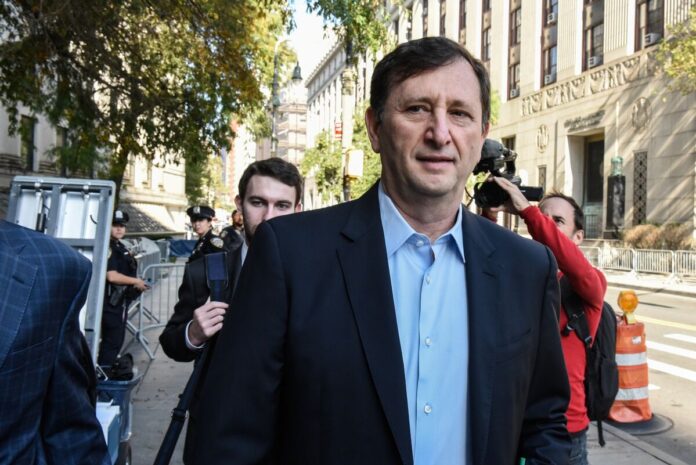- Alex Mashinsky, founder of Celsius Network, faces multiple fraud charges, including securities fraud and wire fraud.
- Celsius Network’s collapse highlighted significant risks and regulatory gaps in the cryptocurrency industry.
In 2017, Alex Mashinsky, an entrepreneur with ideas for democratizing money, co-founded Celsius Network. With his platform, users may earn interest on their crypto holdings and get loans using their assets as collateral, therefore transforming their interaction with cryptocurrency.
With interest rates as high as 17%, Celsius will have accumulated over $13 billion in user deposits by 2021, fast gaining popularity. Many investors seeking consistent profits in the erratic crypto market connected with the platform’s tagline, “The safest place for your crypto.”
Mashinsky’s narrative started long before Celsius, anchored in an innovative and disruptive career. An Israeli-American businessman, he had already co-founded Arbinet, a 2004 publicly traded telecommunications company.
He was a well-liked person in the IT and financial industries since he clearly saw market requirements and addressed them with tech solutions.
The Downfall of Celsius Network
But in 2022, the front of stability at Celsius Network started to fall apart. Celsius stopped all withdrawals during a general market collapse, therefore depriving thousands of users of access to their money.
The next analysis revealed a bleak picture: Celsius has engaged in uncollateralized loans and other high-risk businesses to satisfy its interest requirements, therefore exposing great risks to consumer assets.
When Mashinsky was detained in New York City in July 2023, the scenario grew gloomier. Among the several accusations he was under were wire fraud, commodities fraud, and securities fraud.
Prosecutors claimed he had set up a conspiracy to con consumers by controlling Celsius’s native token, CEL, for personal benefit, therefore defrauding others. The indictment said Mashinsky had profited greatly while misleading consumers about the reliability and profitability of the site, selling over $42 million worth of CEL.
Legal problems for Mashinsky did not stop with his arrest. Separately suing him and Celsius Network are the SEC, CFTC, and FTC. Among these charges were claims of false information to investors and the neglect of registering the business as a commodities pool operator.
Mashinsky’s legal team has been aggressively defending him in spite of these charges, trying to have some of the felony counts dropped and stop allusions to Celsius’s bankruptcy from being included into the trial.
Set for September 2024, the trial looks to be a major legal fight whereby Mashinsky might face up to seven felony counts should he be found guilty.
Personal and Professional Impact
Mashinsky has personally suffered, as well as professionally, from legal problems. Renowned for his public speaking and energetic leadership, he has seen his name damaged.
Many investors have lost big sums of money as a result of Celsius’s fall. The claims of fraud and misbehavior now sharply contradict Mashinsky’s goal of democratizing money and offering financial freedom via cryptocurrency.
Mashinsky’s narrative captures larger problems in the crypto market than only the rise and fall of one man. The charges directed against him highlight the necessity of more industry transparency and regulatory control.
The case has raised awareness of the dangers involved in funding crypto sites run under little government control. It also emphasizes the possibility of abuse and deception in a sector still in its early phases of control, even if it is innovative.
Legal measures against Mashinsky and Celsius fit a more general crackdown on crypto-related fraud by U.S. authorities.
Other well-known personalities, including former FTX and Binance CEOs, have been subject to legal problems for related reasons under this crackdown. Together, these cases strongly convey to the sector the need of regulatory compliance and the results of dishonest behavior.
Reflections on Mashinsky’s Legacy
Mashinsky is getting ready for his trial, and his legacy is still hotly contested. Some see him as a visionary who used technology to try to bring about good changes in the financial sector. Others view him as a warning about arrogance and the dangers of unbridled ambition in the fast-changing realm of cryptocurrency.
Whatever the result of the trial, Mashinsky has unquestionably changed the crypto sector. He helped bring digital banking and blockchain technologies front and center. Still, his narrative also reminds us sharply of the moral and legal obligations accompanying invention.
No spam, no lies, only insights. You can unsubscribe at any time.
Credit: Source link





















 Bitcoin
Bitcoin  Ethereum
Ethereum  Tether
Tether  Solana
Solana  XRP
XRP  Dogecoin
Dogecoin  USDC
USDC  Cardano
Cardano  Lido Staked Ether
Lido Staked Ether  TRON
TRON  Avalanche
Avalanche  Toncoin
Toncoin  Shiba Inu
Shiba Inu  Stellar
Stellar  Wrapped stETH
Wrapped stETH  Wrapped Bitcoin
Wrapped Bitcoin  Polkadot
Polkadot  Chainlink
Chainlink  Bitcoin Cash
Bitcoin Cash  Sui
Sui  WETH
WETH  Pepe
Pepe  LEO Token
LEO Token  NEAR Protocol
NEAR Protocol  Litecoin
Litecoin  Aptos
Aptos  Uniswap
Uniswap  Wrapped eETH
Wrapped eETH  Hedera
Hedera  Internet Computer
Internet Computer  Cronos
Cronos  USDS
USDS  POL (ex-MATIC)
POL (ex-MATIC)  Ethereum Classic
Ethereum Classic  Render
Render  Bittensor
Bittensor  Artificial Superintelligence Alliance
Artificial Superintelligence Alliance  Ethena USDe
Ethena USDe  Bonk
Bonk  Arbitrum
Arbitrum  WhiteBIT Coin
WhiteBIT Coin  Dai
Dai  Cosmos Hub
Cosmos Hub  Filecoin
Filecoin  dogwifhat
dogwifhat  MANTRA
MANTRA  Stacks
Stacks 
